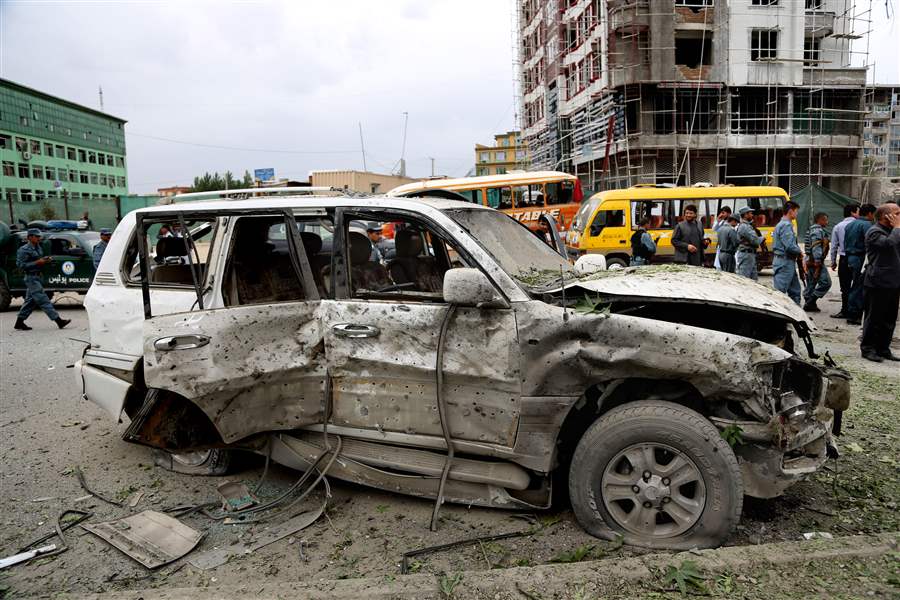
Bombs strike Afghan candidate convoy
6/6/2014
Afghan security personnel investigate the site of a suicide attack that struck the convoy of presidential candidate Abdullah Abdullah in Kabul, Afghanistan, Friday, June 6, 2014. The Afghan Interior Ministry says a suicide bomber and a roadside bomb struck the convoy as it left a campaign event at a wedding hall in the capital Kabul, killing several civilians but leaving the candidate himself unharmed. (AP Photo/Rahmat Gul)
ASSOCIATED PRESS
KABUL — Two blasts struck the convoy of Afghan presidential candidate Abdullah Abdullah as it left a campaign event at a wedding hall in the capital Kabul today, killing four civilians but leaving the candidate himself unharmed, the Interior Ministry said.
Ministry spokesman Sediq Sediqqi said a suicide bomber had struck the convoy followed by a roadside bomb, killing four civilians, with the toll likely to rise. He said no one from Abdullah’s entourage was killed.
But Kabul police chief Mohammed Zahir said both explosions were carried out by suicide bombers — the first was a driver who blew up a vehicle and the second was a suicide bomber on foot. He said two people were killed and 16 wounded.
In a televised statement shortly after the attack, Abdullah, the presidential front runner and former Foreign Minister, said he had not been harmed but that his security guards had been wounded.
An AP reporter who arrived at the scene shortly after the blasts said they destroyed several cars and nearby shop-fronts, leaving the street littered with twisted metal and other rubble.
It was not immediately clear who was behind the attack, but it bore the hallmarks of the Taliban, who are fighting to overthrow the Western-backed government.
Abdullah is the front runner for the June 14 runoff, facing former Finance Minister Ashraf Ghani Ahmadzai. In the first round of elections April 5, Abdullah garnered 45 percent of votes while Ahmadzai came in second with 31.6 percent.
During the Soviet occupation in the 1980s, Abdullah served as adviser to and spokesman for Tajik warlord Ahmad Shah Massoud, who was assassinated by al-Qaeda two days before the Sept. 11, 2001 attack.
In the early days after the U.S.-led alliance toppled the Taliban, Abdullah became the face of Afghanistan’s anti-Taliban movement, giving frequent press conferences to international media. He served as foreign minister and then was the runner-up in President Hamid Karzai’s disputed re-election in 2009.
Whoever wins the June 14 vote will replace Karzai, who is constitutionally barred from seeking a third term. The next president will also preside over the withdrawal of foreign troops at the end of the year.